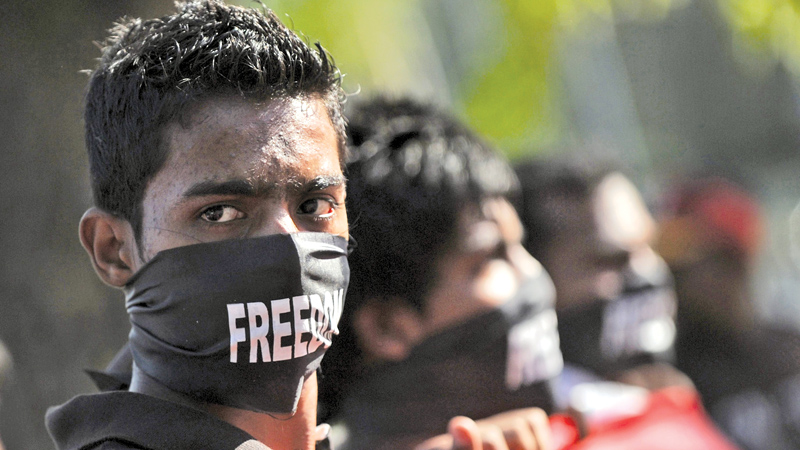Sri Lanka can ill afford renewed tensions or disruption to peace or harm to lives of persons due to tensions between utterances directed at ethnic groups by clergy belonging to religious faiths in the country.
For close on twenty two years there have been stresses and tensions around these issues in the country. Groups who have worked on them have failed their followers. In the rush to polarize between different perceived camps of political leaders the need to protect the right to profess a faith whilst ensuring the sensitivities of persons of other communities are not hurt has fallen by the way side. This writer has intimate knowledge of such failures and machinations which prevent success around these efforts. Ultimately the country is torn apart and set on fire.
ONUR statement
Chairperson, Office for National Unity and Reconciliation, Chandrika Bandaranaike Kumaratunga says that “The strictest action must be taken without delay, against persons or groups who act to provoke disharmony by creating divisions among citizens along ethnic and religious lines.”
 A recent statement goes on to state, “Hate filled expressions and actions by groups with vested interests, resulting in demeaning, denigrating and inciting violence against fellow citizens of various ethnic, religious backgrounds has no place in Sri Lankan society.
A recent statement goes on to state, “Hate filled expressions and actions by groups with vested interests, resulting in demeaning, denigrating and inciting violence against fellow citizens of various ethnic, religious backgrounds has no place in Sri Lankan society.
The strictest action must be taken without delay, against persons or groups who act to provoke disharmony by creating divisions among citizens along ethnic and religious lines. President Maithripala Sirisena, Prime Minister Ranil Wickremesinghe and the entire government have categorically reiterated that hate speech will not be tolerated.”
We note that there are numerous complaints against hate speech and incitement to racism where strong evidence is available yet investigations and prosecutions are pending for some time. We urge the law enforcement authorities to take early action on all these incidents.
We welcome the President and the Prime Minister’s unequivocal statements that we cannot permit racist or extremist elements from any community to challenge or imperil our chosen path to a stable, prosperous and plural Sri Lanka.
Delicate balance
Balancing freedom of expression and the prohibition of incitement to hatred is no simple task. Distinguishing those forms of expression that should be defined as incitement to hatred and thus prohibited is contextual and the individual circumstances of each case, such as local conditions, history, cultural and political tensions, must be taken into account. It’s important to note the distinction between protecting rights of ethnic, national or religious groups, holding specific beliefs or opinions, from hostility, discrimination or violence and freedom to critique belief systems, religions or institutions.
Freedom of expression is essential to creating an environment in which constructive discussion about religious matters could be held. Indeed, free and critical thinking in open debate is the soundest way to probe whether religious interpretations adhere to or distort the original values that underpin religious belief. Right to freedom of religion or belief, as enshrined in relevant international legal standards, does not include the right to have a religion or a belief that is free from criticism or ridicule.
Test for criminal offences
Context: Context is of great importance when assessing whether particular statements are likely to incite discrimination, hostility or violence against the target group and it may have a direct bearing on both intent and/or causation. Analysis of the context should place the speech act within the social and political context prevalent at the time the speech was made and disseminated;
Speaker: The speaker’s position or status in the society should be considered, specifically the individual’s or organisation’s standing in the context of the audience to whom the speech is directed;
Intent: Article 20 of the International Covenant on Civil and Political Rights anticipates intent. Negligence and recklessness are not sufficient for an act to be an offence under article 20 of the Covenant, as this article provides for “advocacy” and “incitement” rather than the mere distribution or circulation of material. In this regard, it requires the activation of a triangular relationship between the object and subject of the speech act as well as the audience.
Content and form: The content of the speech constitutes one of the key foci of the court’s deliberations and is a critical element of incitement. Content analysis may include the degree to which the speech was provocative and direct, as well as the form, style, nature of arguments deployed in the speech or the balance struck between arguments deployed;
Extent of the speech act: Extent includes such elements as the reach of the speech act, its public nature, its magnitude and size of its audience. Other elements to consider include whether the speech is public, what means of dissemination are used, for example by a single leaflet or broadcast in the mainstream media or via the Internet, the frequency, the quantity and the extent of the communications, whether the audience had the means to act on the incitement, whether the statement (or work) is circulated in a restricted environment or widely accessible to the general public;
Likelihood, including imminence: The action advocated through incitement speech does not have to be committed for said speech to amount to a crime. Nevertheless, some degree of risk of harm must be identified. It means that the courts will have to determine that there was a reasonable probability that the speech would succeed in inciting actual action against the target group, recognizing that such causation should be rather direct.
We need to act swiftly and wisely in preserving peace in the country.



There are 2 Comments
free speech sans hate
Hate
Add new comment